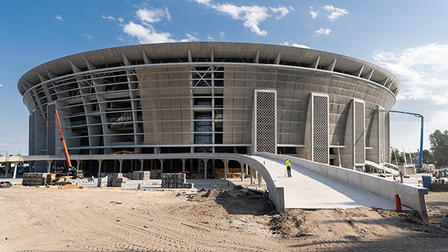At 4.9%, Budapest’s economy was one of the fastest growing in Europe in 2018. The city's economy expanded by 5.3% in the first quarter of 2019 and, according to European Commission forecasts, will grow at 4.4% over the rest of 2019.
This flourishing economy is leading to high demand for real estate of all types. The vacancy rate for office space in Budapest stood at 6.3% during the first half of 2019, 1.3% lower than the same period in 2018, according to real estate service provider CBRE.
Advertisement
Leasing demand remained strong in the second quarter, with agreements signed for 163,400 square metres, more than double the amount for the first quarter. The biggest deal in the second quarter was a pre-lease signed by BP for 22,100 square metres in the Agora Budapest development.
Big developments
The second quarter of 2019 also saw three new office completions in Budapest with a combined volume of 31,700 square metres. The only new-build delivery was 23,700-square-metre Corvin Technology and Science Park in the Corvin Quarter, Central Pest.
“Hungary had the second fastest growing economy in Europe during the first quarter of 2019,” says Róbert Ésik, president of the Hungarian Investment Promotion Agency.
“We are seeing a very high level of FDI inflows and it is resulting in strong demand for real estate throughout the country. Last year we witnessed a 60% increase in investment projects in the services sector, which includes business services, engineering, R&D and software development,” he adds.
A healthy picture
Advertisement
The investment volume in Budapest for the first half of 2910 reached €462m, a 24% jump on the same period of 2018, according to CBRE. The market was driven mainly by the office sector, which made up 63% of total turnover. The prime yield in office, shopping centre and high street spaces in the capital stood at 5.5% during the second quarter of 2019, while in industrial space it was at 7%.
“Currently, Hungary’s real estate market is very healthy in every segment,” says Noah Steinberg, chief executive officer at Wing, the country’s leading real estate developer and investment company and a member company of the Real Estate Developers’ Roundtable Association.
“However, the market is not overheating; growth is sustainable," he adds. "The economy has been expanding at a rate of 3% to 4%, which is attractive by European standards. Office demand is being driven by existing companies expanding their operations and by new companies establishing themselves here for the first time.
“Hotels are another real estate sector that is performing very well. Tourism in Hungary is growing strongly, reflected in the increased passenger traffic at Budapest Ferenc Liszt International Airport and in the strongly improving indicators of the hotel industry.”
Cultural redevelopment
Budapest is home to Europe’s largest and most ambitious urban cultural development, Liget Budapest Project, which involves a €1bn renewal of the city’s 100-hectare, world-famous public park, Városliget. The project will be fully completed in 2023.
“We have registered 4.75 million individual visits to the Városliget annually,” says Benedek Gyorgyevics, chief executive officer at Városliget, the company co-ordinating the park’s redevelopment. “Conservative estimates indicate that the Liget Budapest Project will lead to this number increasing to between 6.5 million and 7 million per year.”
The Hungarian government is also financing a new Ft143bn ($483.5m) national arena and cultural event centre at Puskás in Budapest. “We have a very strict schedule: the complex must be finished by November 15, 2019,” says Csaba Tóth, director-general of project development at the Centre of Key Government Investments, known as KKBK. “That is the date of the Hungarian national football team’s game versus Uruguay – the first official event at our brand new 67,000-seater home.”
In association with Budapest, Hungary. Reporting and editing were carried out independently by fDi Magazine.
